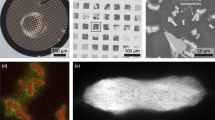Abstract
WE have recently studied the effect of electron bombardment on rock salt crystal obtained from the Halle Company in Germany. It was found that the blue or colloidal coloration was produced on the surface of the specimen bombarded with electrons at high temperature1. In the course of the experiments we have also observed that the dark blue rings or circles were scattered on the coloured surface. In this communication we shall be concerned mainly with the behaviour of these rings or circles.
This is a preview of subscription content, access via your institution
Access options
Subscribe to this journal
Receive 51 print issues and online access
$199.00 per year
only $3.90 per issue
Buy this article
- Purchase on Springer Link
- Instant access to full article PDF
Prices may be subject to local taxes which are calculated during checkout
Similar content being viewed by others
References
Yoshida, S., and Ikeda, T., J. Phys. Soc. Japan, 14, 473 (1959).
Author information
Authors and Affiliations
Rights and permissions
About this article
Cite this article
YOSHIDA, S., IKEDA, T. Dark Blue Ring developed by Electron Bombardment in Rock Salt. Nature 185, 755–756 (1960). https://doi.org/10.1038/185755a0
Issue Date:
DOI: https://doi.org/10.1038/185755a0
This article is cited by
-
The role of activated salts in ice nucleation
Zeitschrift für angewandte Mathematik und Physik ZAMP (1962)
Comments
By submitting a comment you agree to abide by our Terms and Community Guidelines. If you find something abusive or that does not comply with our terms or guidelines please flag it as inappropriate.



